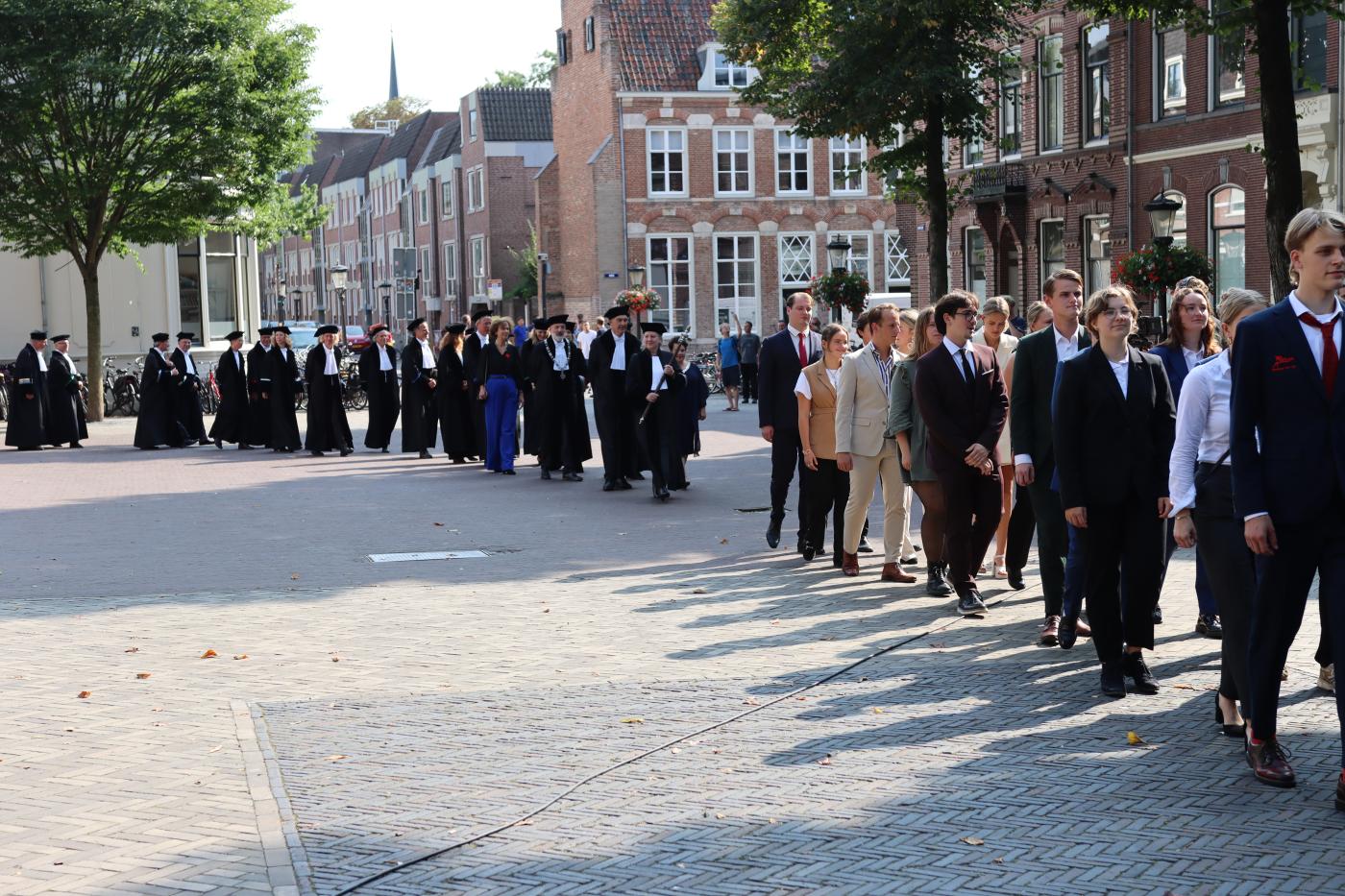A little bit of noise, no occupations
Few protests at opening of new academic year

Last year’s student protests against the collaboration with Israel are etched in our memories. There were occupations and acts of vandalism. Administrators sometimes called in the police to clear out the buildings.
But in the summer it was quiet and at the start of the new academic year, there wasn’t a lot of ruckus either, despite the situation in Gaza being just as horrific as before. There were a few protest signs, for example at the "Alternative opening" of the academic year in Utrecht. In Groningen, the protesters made noise, briefly disrupting the festivities. It didn’t get more serious than that.
Update: Friday afternoon, a few days after the opening of the new academic year, around a thousand protesters went to a campus of the University of Amsterdam. The board doesn’t want to “intervene immediately at the first tents”, writes university magazine Folia.
“Great and justified”
Several university administrators looked back at the protests. They were very understanding of them, but condemned the vandalism on campus and underlined that you should always be able to talk to one another at a university.
The heaviest riots occurred last year at the University of Amsterdam. On Monday, President Edith Hooge said: “No matter how great and justified the anger about the situation in the Middle East, we have the task of protecting our university community and of taking everyone’s feelings, situations and perspectives into account. There’s no place for harassment, vandalism and violence here.”
Anton Pijpers, president of the Utrecht University Executive Board, outlined the dilemmas the board faced. During the occupation, emergency exits were blocked with broomsticks, chains, tables and chairs, he said. “I don’t want to think about one of the demonstrating students or employees getting ill or a fire breaking out. If such a thing had happened, it would have been difficult for emergency services to help quickly.” That’s why, in his opinion, it was unavoidable to have the area cleared out. “If we can no longer guarantee safety, that's it.”
He also shouldered some of the blame himself: “Perhaps we haven't done things well, underestimating the need to make our discussions and considerations regarding this subject visible.”
Where do we go from here?
Pijpers says he has taken on board “the feelings of unsafety caused by the ending of the occupations”. But there are also staff and students “with Jewish and/or Israeli roots who no longer dare to come to our university because they feel unsafe due to incidents”. In the time ahead, he therefore wants to keep discussing the right to protest and safety at the university.
In Nijmegen, Rector José Sanders placed the student protests into a historical perspective. “Students everywhere have always been intelligent and conscientious people of the future, who are in the process of determining how they want to be part of society and what perspective they have of reality. This is precious.” Protesting is a fundamental right, she said, “even if others sometimes find it difficult, it remains a great good, also—and especially—at the university.”
Cut ties
The protesters still want universities to cut their ties with Israeli institutions. Universities aren’t willing to do so just like that, they wrote in a joint letter to the editor just before the summer holiday. They prefer to have the individual collaborations assessed by a committee. How’s that going?
In Nijmegen, things aren’t off to a smooth start. The committee was to be launched this summer, but so far it hasn’t worked out. In Rotterdam, a first recommendation has been issued: there, the committee doesn’t want any new collaborations with universities from Israel or Palestine for the moment.
The Rotterdam Committee also listed the criteria for collaborative partnerships. Human rights, knowledge security, ethical considerations, the university’s reputation: it’s all factored in. A verdict by the International Court of Justice could also be an argument, says the committee. On the other hand, it values ‘soft’ diplomacy: spreading the culture and values of Erasmus University in worldwide collaborations.
In July, the International Court of Justice ruled that the occupation of Palestinian territories by Israel is unlawful. Whether this is decisive in certain cases remains to be seen. In the time ahead, the Rotterdam committee will assess all of the collaborative partnerships with Israeli institutions.